Learn linear algebra well and play with recommendation systems
Author| Wang Hao
##Reviewer| Chonglou
Speaking of 21 century Internet technology, in addition to Python/Rust/Go etc. The birth of a series of new programming languages and the vigorous development of information retrieval technology are also a highlight. The first pure technology business model on the Internet was search engine technology represented by Google and Baidu. However, what everyone doesn’t expect is that the recommendation system was born a long time ago. As early as 1992 , the first recommendation system in human history was published in the form of a paper. At this time, Google and Baidu had not yet been born.

Unlike search engines, which are considered to be a necessity, many unicorns were soon born. Technology companies with recommendation systems as their core technology will not appear until the rise of Toutiao and Douyin in the 2010s. There is no doubt that Toutiao and Douyin have become the most successful representative companies in recommendation systems. If the first-generation information retrieval technology search engine was pre-empted by Americans, then the second-generation information retrieval technology recommendation system is firmly controlled by the Chinese. And we have now encountered the third generation of information retrieval technology —— Information retrieval based on large language models. At present, the first movers are European and American countries, but China and the United States are currently moving forward together. In recent years, the authoritative conference in the field of recommendation systems
RecSys has frequently awarded the best paper award to sequence Recommendation(Sequential Recommendation). This shows that this field is paying more and more attention to vertical applications. There is a vertical application of recommendation system that is so important, but it has not made huge waves so far. This field is scenario-based recommendation (Context-aware Recommendation), referred to as CARS. We occasionally see some CARS Workshop, but these Workshop papers There are no more than 10 articles per year, and there is not much to do. CARS
What can it be used for? First of all CARS is already used by fast food companies such as Burger King. It can also recommend music to the user based on the scene while the user is driving the car. In addition, we can think about it, is it possible for us to recommend travel plans to users based on weather conditions? Or recommend meals to users based on their physical condition? In fact, as long as we give full play to our imagination, we can always find different practical applications for CARS .
However, the question arises, since CARS is so widely used, why do so few people publish papers? The reason is simple, because CARS There are almost no public datasets available. Currently the best public dataset for CARS is the LDOS-CoMoDa dataset from Slovenia. Apart from this, it is difficult to find other data sets. LDOS-CoMoDa uses the form of survey to provide users with scene data when watching movies, making the majority of researchers engaged in CARS research become possible. The data was made public from around 2012 to 2013 , but currently very few people know about this data collection.
Getting back to business, this article mainly introduces the MatMat / MovieMat algorithm and the PowerMat algorithm. These algorithms are powerful tools for solving CARS problems. Let's first take a look at how MatMat defines the CARS problem: We first redefine the user rating matrix, we put the user rating matrix Replace each rating value with a square matrix. The diagonal elements of the square matrix are the original score values, and the off-diagonal elements are scene information.
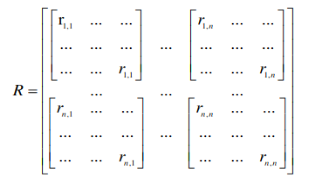
We define below the loss function of the MatMat algorithm, which modifies the classic matrix decomposition The loss function has the following form:

where U and V are all matrices. In this way, we change the vector dot product in the original matrix factorization. Turn vector dot multiplication into matrix multiplication. Let’s take the following example:

Let’s do some performance testing on MovieLens Small Dataset Comparative experiments, the following results are obtained:
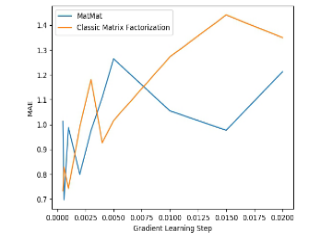
It can be seen that the MatMat algorithm is better than Classic matrix factorization algorithm. Let’s check the fairness of the recommendation system again:
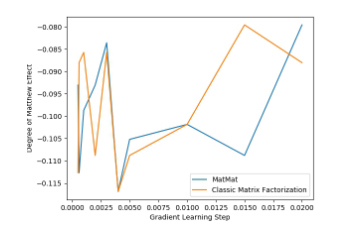
It can be seen that MatMat still performs equally well in terms of fairness indicators. The solution process of MatMat is relatively complicated. Even the author who invented the algorithm did not write the derivation process in the paper. But as the saying goes, if you learn linear algebra well, you will not be afraid of traveling all over the world. I believe that smart readers will be able to derive the relevant formulas and implement this algorithm. MatMat The original address of the algorithm paper can be found at the following link: https://www.php.cn/link/9b8c60725a0193e78368bf8b84c37fb2 . This paper is the Best Paper Report Award of the International Academic Conference IEEE ICISCAE 2021 .
MatMat algorithm is applied in the field of scene-based movie recommendation. The movie instance of this algorithm is named MovieMat. The rating matrix of MovieMat is defined as follows:

The author then conducted a comparative experiment :
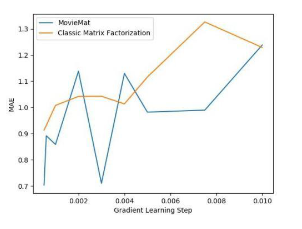
On the LDOS-CoMoDa data collection, MovieMat The performance is much higher than that of classic matrix decomposition. Let’s take a look at the fairness evaluation results:
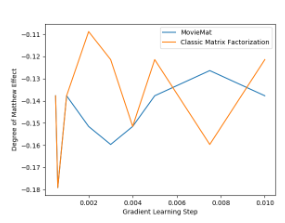
##In terms of fairness, classic matrix decomposition has achieved better results than MovieMat results. The original paper of MovieMat can be found at the following link: https://www.php.cn/link/f4ec6380c50a68a7c35d109bec48aebf .
We sometimes encounter such problems. What should we do when we arrive at a new location and only have scene data but no user rating data? It doesn’t matter, Ratidar Technologies LLC (Beijing Daping Qizhi Network Technology Co., Ltd.) invented ## based on zero-sample learning #CARS Algorithm—— PowerMat. The original paper of PowerMat can be found at the following link: https://www.php.cn/link/1514f187930072575629709336826443 . The inventor of
PowerMatborrowed from MAP and DotMat, the following MAP function is defined:

where U is the user feature vector, V is the item feature Vector, R is the user rating value, and C is the scene variable. Specifically, we get the following formula:

Using stochastic gradient descent to solve this problem, we get the following formula:

Through observation, we found that there are no variables related to input data in this set of formulas, so PowerMat is A zero-shot learning algorithm that is relevant only to scenarios. This algorithm can be applied in the following scenarios: tourists plan to travel to a certain place, but have never been there, so they only have weather and other scene data. We can use PowerMat to recommend check-in attractions to tourists etc.
The following is the comparison data between PowerMat and other algorithms:

Through this picture, we found that PowerMat and MovieMat are evenly matched, is not are comparable, and the results are better than the classic matrix decomposition algorithm. The picture below shows that even in terms of fairness indicator, PowerMat still performs strongly:
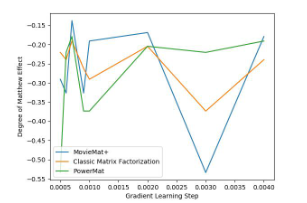
Through comparative experiments, we found that PowerMat is excellent CARS algorithm.
Internet data engineers often say that data is above all else. And around the 2010 era, there was a strong trend on the Internet that was bullish on data and bearish on algorithms. CARS is a good example. Because the vast majority of people do not have access to relevant data, the development of this field has been greatly restricted. Thanks to Slovenian researchers for making the LDOS-CoMoDa data collection public, we have the opportunity to develop this field. We also hope that more and more people will pay attention to CARS, implement CARS, and contribute to CARS Financing……
About the author
Wang Hao, former head of Funplus Artificial Intelligence Laboratory. He has held technology and technology executive positions in ThoughtWorks, Douban, Baidu, Sina and other companies. Working in Internet companies, financial technology, gaming and other companies for #13 years, he has profound insights and rich experience in fields such as artificial intelligence, computer graphics and blockchain. Published 42 papers in international academic conferences and journals, and won IEEE SMI 2008 Best Paper Award, ICBDT 2020 / IEEE ICISCAE 2021 / AIBT 2023 / ICSIM 2024 Best Paper Report Award.
The above is the detailed content of Learn linear algebra well and play with recommendation systems. For more information, please follow other related articles on the PHP Chinese website!

Hot AI Tools

Undresser.AI Undress
AI-powered app for creating realistic nude photos

AI Clothes Remover
Online AI tool for removing clothes from photos.

Undress AI Tool
Undress images for free

Clothoff.io
AI clothes remover

AI Hentai Generator
Generate AI Hentai for free.

Hot Article

Hot Tools

Notepad++7.3.1
Easy-to-use and free code editor

SublimeText3 Chinese version
Chinese version, very easy to use

Zend Studio 13.0.1
Powerful PHP integrated development environment

Dreamweaver CS6
Visual web development tools

SublimeText3 Mac version
God-level code editing software (SublimeText3)

Hot Topics
 1376
1376
 52
52
 How to roll positions in digital currency? What are the digital currency rolling platforms?
Mar 31, 2025 pm 07:36 PM
How to roll positions in digital currency? What are the digital currency rolling platforms?
Mar 31, 2025 pm 07:36 PM
Digital currency rolling positions is an investment strategy that uses lending to amplify trading leverage to increase returns. This article explains the digital currency rolling process in detail, including key steps such as selecting trading platforms that support rolling (such as Binance, OKEx, gate.io, Huobi, Bybit, etc.), opening a leverage account, setting a leverage multiple, borrowing funds for trading, and real-time monitoring of the market and adjusting positions or adding margin to avoid liquidation. However, rolling position trading is extremely risky, and investors need to operate with caution and formulate complete risk management strategies. To learn more about digital currency rolling tips, please continue reading.
 How to calculate the transaction fee of gate.io trading platform?
Mar 31, 2025 pm 09:15 PM
How to calculate the transaction fee of gate.io trading platform?
Mar 31, 2025 pm 09:15 PM
The handling fees of the Gate.io trading platform vary according to factors such as transaction type, transaction pair, and user VIP level. The default fee rate for spot trading is 0.15% (VIP0 level, Maker and Taker), but the VIP level will be adjusted based on the user's 30-day trading volume and GT position. The higher the level, the lower the fee rate will be. It supports GT platform coin deduction, and you can enjoy a minimum discount of 55% off. The default rate for contract transactions is Maker 0.02%, Taker 0.05% (VIP0 level), which is also affected by VIP level, and different contract types and leverages
 Tutorial on how to register, use and cancel Ouyi okex account
Mar 31, 2025 pm 04:21 PM
Tutorial on how to register, use and cancel Ouyi okex account
Mar 31, 2025 pm 04:21 PM
This article introduces in detail the registration, use and cancellation procedures of Ouyi OKEx account. To register, you need to download the APP, enter your mobile phone number or email address to register, and complete real-name authentication. The usage covers the operation steps such as login, recharge and withdrawal, transaction and security settings. To cancel an account, you need to contact Ouyi OKEx customer service, provide necessary information and wait for processing, and finally obtain the account cancellation confirmation. Through this article, users can easily master the complete life cycle management of Ouyi OKEx account and conduct digital asset transactions safely and conveniently.
 What are the recommended websites for virtual currency app software?
Mar 31, 2025 pm 09:06 PM
What are the recommended websites for virtual currency app software?
Mar 31, 2025 pm 09:06 PM
This article recommends ten well-known virtual currency-related APP recommendation websites, including Binance Academy, OKX Learn, CoinGecko, CryptoSlate, CoinDesk, Investopedia, CoinMarketCap, Huobi University, Coinbase Learn and CryptoCompare. These websites not only provide information such as virtual currency market data, price trend analysis, etc., but also provide rich learning resources, including basic blockchain knowledge, trading strategies, and tutorials and reviews of various trading platform APPs, helping users better understand and make use of them
 Binance binance computer version entrance Binance binance computer version PC official website login entrance
Mar 31, 2025 pm 04:36 PM
Binance binance computer version entrance Binance binance computer version PC official website login entrance
Mar 31, 2025 pm 04:36 PM
This article provides a complete guide to login and registration on Binance PC version. First, we explained in detail the steps for logging in Binance PC version: search for "Binance Official Website" in the browser, click the login button, enter the email and password (enable 2FA to enter the verification code) to log in. Secondly, the article explains the registration process: click the "Register" button, fill in the email address, set a strong password, and verify the email address to complete the registration. Finally, the article also emphasizes account security, reminding users to pay attention to the official domain name, network environment, and regularly updating passwords to ensure account security and better use of various functions provided by Binance PC version, such as viewing market conditions, conducting transactions and managing assets.
 On which platform is web3 transaction?
Mar 31, 2025 pm 07:54 PM
On which platform is web3 transaction?
Mar 31, 2025 pm 07:54 PM
This article lists the top ten well-known Web3 trading platforms, including Binance, OKX, Gate.io, Kraken, Bybit, Coinbase, KuCoin, Bitget, Gemini and Bitstamp. The article compares the characteristics of each platform in detail, such as the number of currencies, trading types (spot, futures, options, NFT, etc.), handling fees, security, compliance, user groups, etc., aiming to help investors choose the most suitable trading platform. Whether it is high-frequency traders, contract trading enthusiasts, or investors who focus on compliance and security, they can find reference information from it.
 Currency Trading Network Official Website Collection 2025
Mar 31, 2025 pm 03:57 PM
Currency Trading Network Official Website Collection 2025
Mar 31, 2025 pm 03:57 PM
It ranks among the top in the world, supports all categories of transactions such as spot, contracts, and Web3 wallets. It has high security and low handling fees. A comprehensive trading platform with a long history, known for its compliance and high liquidity, supports multilingual services. The industry leader covers currency trading, leverage, options, etc., with strong liquidity and supports BNB deduction fees.
 C language data structure: the key role of data structures in artificial intelligence
Apr 04, 2025 am 10:45 AM
C language data structure: the key role of data structures in artificial intelligence
Apr 04, 2025 am 10:45 AM
C Language Data Structure: Overview of the Key Role of Data Structure in Artificial Intelligence In the field of artificial intelligence, data structures are crucial to processing large amounts of data. Data structures provide an effective way to organize and manage data, optimize algorithms and improve program efficiency. Common data structures Commonly used data structures in C language include: arrays: a set of consecutively stored data items with the same type. Structure: A data type that organizes different types of data together and gives them a name. Linked List: A linear data structure in which data items are connected together by pointers. Stack: Data structure that follows the last-in first-out (LIFO) principle. Queue: Data structure that follows the first-in first-out (FIFO) principle. Practical case: Adjacent table in graph theory is artificial intelligence




